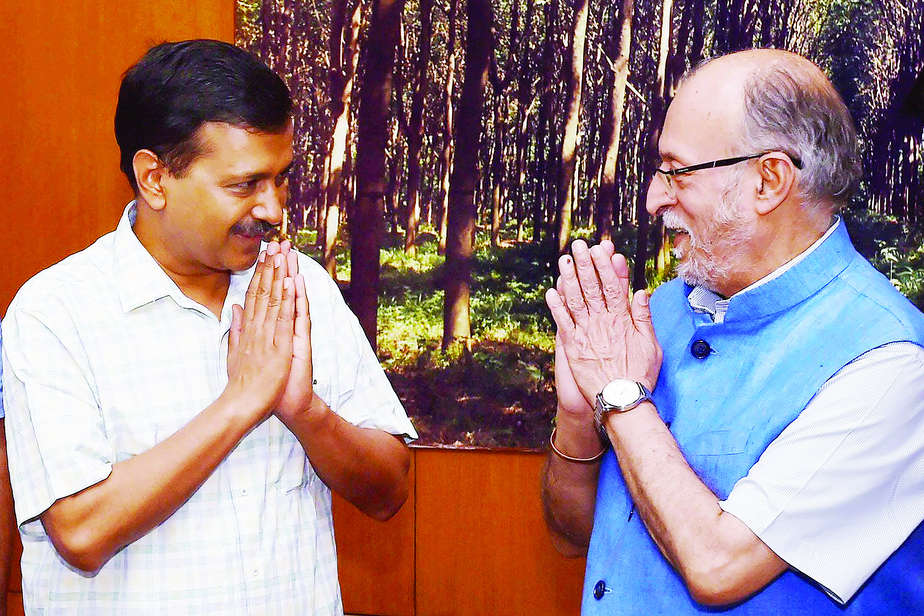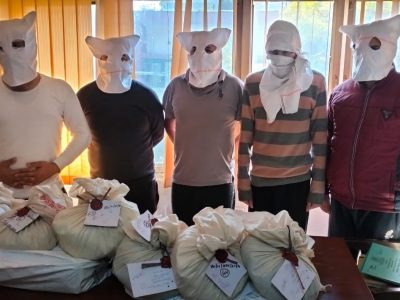For the last three years, the national capital has stood witness to an unending slugfest between the Lieutenant Governor’s office and the Secretariat. The Arvind Kejriwal-led government has repeatedly accused the LG of working like a puppet of the Bharatiya Janata Party-led Central government. The Centre, to help matters along, kept curtailing the powers of the elected government in Delhi citing various constitutional provisions.
The breakdown in relations can be traced back to when the Central government snatched away the control of the Anti-Corruption Branch (ACB) from the Kejriwal government. Thereafter, one after the other, various responsibilities were handed over to the LG’s office.
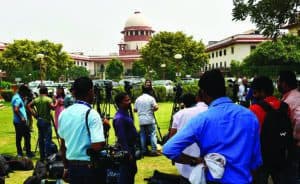
The Delhi High Court’s August 4, 2016 judgement proved almost fatal for the AAP-led government when it declared the LG as the administrative head of the National Capital Territory of Delhi and was not required to act on the advice of the Cabinet.
What followed was utter chaos, administrative impasse, protests and dharnas.
On July 4, the Supreme Court’s five-judge constitutional bench pronounced its judgement — which to an extent has finally turned the tables in the AAP government’s favour. The judgement states that the LG is bound by the “aid and advice” of the elected government and cannot interfere in each and every decision of the government.
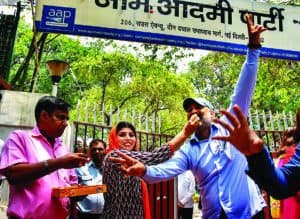
Right after the judgement was delivered, the Central government’s counsel, Assistant Solicitor General Maninder Singh claimed that it was a victory for the Centre. “The court has not accepted the contention that Delhi government be treated like any state government and the Lieutenant Governor should be taken as governor of any other state,” Singh told the media.
Advocate and BJP leader, Nalin Kohli told Newslaundry, “Like for some political leaders, poverty is state of mind, for them [AAP] victory is a state of mind. It is a victory of the constitutional democracy and provision that existed [Article 239 AA]
Delhi Government’s counsel, Rahul Mehra, too claimed victory. Speaking to Newslaundry, Mehra said, “The aid and advice of the council of ministers will be binding on the honourable LG.” He also claimed that the services department will be now under the Kejriwal government and they can carry out the transfer and posting of the officers. Importantly, Kejriwal and his Cabinet didn’t even waste a day to issue orders related to transfers and postings.
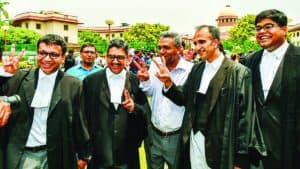
While both sides are claiming victory, the question is, exactly who won? According to legal experts, the constitutional bench of the Chief Justice of India, Dipak Misra and Justices AK Sikri, AM Khanwilkar, DY Chandrachud and Ashok Bhushan has reiterated the provisions under Article 239AA. The moral lectures given in the judgement indicated that it is in favour of the AAP government.
Importantly, neither former LG Najeeb Jung or incumbent Anil Baijal gave a nod to several AAP government’s proposals citing the fact that prior permissions for the proposals were not taken from the Raj Niwas. The ugliest showdown between the two sides probably took place during the recent Delhi Assembly sessions where IAS officers working with the Delhi government refused to respond to several questions posed to them – citing that those subjects were reserved with the LG office.
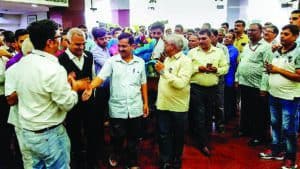
However, the 535-page verdict by the constitutional bench has ended the scope for such disputes or loggerheads. While CJI Misra read his and Justices Sikri and Khanwilkar’s judgement, Justice Chandrachud and Justice Bhushan gave their separate verdicts.
The judges, in the verdict, pronounced a series of moral lectures on democracy, institutions and stated how both the LG and the government should work together. These are seven salient points which clearly show that whatever the BJP’s claims, this judgement is indeed a major setback for the LG:
1. ‘LG no independent authority’
Clearing the confusion, if any, Justice Chandrachud in his verdict said that the LG is not an independent authority. In point number 20 of the conclusion, he said, “…there is no independent authority vested in Lieutenant Governor to take decisions (save and except on matters where he exercises his discretion as a judicial or quasi-judicial authority under any law or has been entrusted with powers by the President under Article 239 on matters which lie outside the competence of the Government of NCT)…”
2. ‘LG to work on aid and advice of the council of ministers’
The Delhi HC in its August 4, 2016 verdict has said that the AAP government’s contention that the LG is bound to act on the advice of the Council of Ministers “is without any substance and cannot be accepted”. Reversing this verdict, the five-judge bench unanimously pronounced that the LG has to act on the “aid and advice of the council of the ministers”.
CJI Misra, Justices Sikri and Khanwilkar in a united judgement in point number xvii [page 231] said: “The Lieutenant Governor has not been entrusted with any independent decision making power. He has to either act on the ‘aid and advice’ of Council of Ministers or he is bound to implement the decision 232 taken by the President on a reference being made by him.”
It states that because the Cabinet owes a duty towards the legislature for every action taken, each Ministry and every Minister is responsible for every act of the Ministry, hence the LG must work on their “aid and advice”.
3. ‘Can’t differ on every matter and refer it to the President’
The LG can disagree with the “aid and advice” of the Council of Ministers and can send such matters to the President. However, the judges unanimously also stated in their verdicts that not every matter can be sent to the President.
The three judges in point xviii of their common verdict said the words “any matter” employed in the proviso to clause (4) of Article 239AA cannot be inferred to mean “every matter”. It clearly stated that the power of the LG under the proviso represents the exception and not the general rule. It also states, “The Lieutenant Governor should not act in a mechanical manner without due application of mind so as to refer every decision of the Council of Ministers to the President.”
4. ‘LG – a limited administrator’
CJI Misra, Justices Sikri and Khanwilkar in their common judgement have clearly laid out that [in point xii] the status of NCT of Delhi is sui generis (a class apart), and the status of the Lieutenant Governor of Delhi is that of “an Administrator, in a limited sense, working with the designation of Lieutenant Governor.”
5. Delhi government only need to inform the LG and not seek his permission
The Delhi HC order had made it mandatory for the elected government to seek the LG’s permission for every proposal and scheme. Reversing this order, the constitutional bench ordered that the Council of Ministers simply need to “inform” the LG and not seek his permission. Justice Bhushan in his judgement ordered, “…the Constitutional Scheme does not suggest that the decisions by the Council of Ministers require any concurrence of the LG.”
In layman’s language, the Kejriwal government no longer needs the LG’s permission for implementing proposals such as “doorstep delivery of ration”.
6. Legislative assembly and ministers to govern Delhi
Justice Chandrachud, in part M of his judgement, states that by adopting Article 239AA, Parliament provided Delhi with a special status. The Article 239AA “mandates the existence of a legislative assembly and Council of Ministers to govern the affairs of the National Capital.”
7. ‘Executive power coextensive with Legislative power’
Ensuring that policies framed by the legislative bodies get implemented, the judgement also addressed executive powers. Justice Bhushan in his judgement states, “Executive power is coextensive with the legislative power” and that, “the Policy of legislation can be given effect to only by executive machinery.”
Ensuring that the LG’s office feels the effect of the constitutional bench’s judgement, the AAP swung into action on Wednesday itself. After declaring the judgement “a big victory for the people of Delhi” and “a big victory of democracy”, Kejriwal held a Cabinet meeting and directed functionaries to expedite proposals of doorstep delivery of rations and CCTV.
As of now at least, despite the proclamations by the BJP and the Centre’s counsel, it seems that the responsibility and onus of running the NCT lie firmly at the door of the elected AAP government. No small relief for the people of Delhi, who have been the ones bearing the brunt of the impasse between the LG and the AAP government.
Delhi impasse will continue, says Prashant Bhushan
Problem is in the way Article 239AA(4) is worded. If the LG wants to obstruct issues like education, mohalla clinics, he can use the proviso which is left intact, Prashant Bhushan tells Amit Bhardwaj.
The Supreme Court judgement on the powers of the Delhi Lieutenant Governor proceeds on the lines of the wording of the Constitution itself regarding Delhi — a union territory but given special status by having a legislative assembly. What was in contention in today’s judgement was Clause 4 of Article 239AA of the Constitution.
Article 239AA(4) says: “There shall be a Council of Ministers consisting of not more than ten per cent, of the total number of Members in the Legislative Assembly, with the Chief Minister at the head to aid and advise the Lieutenant Governor in the exercise to his functions in relation to matters with respect to which the Legislative Assembly has power to make laws, except in so far as he is, by or under any law, required to act in his discretion. Provided that in the case of difference of opinion between the Lieutenant Governor and his ministers on any matter, the Lieutenant Governor shall refer it to the President for decision and act according to the decision given thereon by the President and pending such decision it shall be competent for the Lieutenant Governor in any case where the matter, in his opinion, is so urgent that it is necessary for him to take immediate action, to take such action or to give such direction in the matter as he deems necessary.”
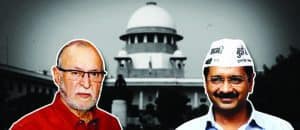
So the whole issue before the court was whether, under 239AA and its proviso, the LG can refuse to act on the basis of the aid and advice of the state government. The Supreme Court judgement says – yes. If he differs with the aid and advice of the state government, it is not incumbent or necessary for him to act on it. In such a case, he can refer the matter to the President, and will be bound by what the President says.
However, the court said this doesn’t mean he can — or should — differ on each and every small or petty matter, and he should facilitate and not obstruct governance. It needs to be an important or crucial matter only. However, the court hasn’t defined what it means by “important” or “crucial” matters. So basically, in all important matters where the view of the LG is different from the view of the state government, he can refer the matter to the President. This means the central government — and its views or decisions — will prevail.
When it comes down to the crunch, the judgement essentially goes by the letter of the Constitution under 239AA and the proviso to that, which means the final word on all important matters is still with the central government. The situation remains the same. On any important matter, the LG and so the central government can always overrule the state government.
While there is some rhetoric in favour of the state government, the final wording or conclusions of the judgement is in accordance with the letter of 239AA proviso, giving overriding power to the Centre on any matter in which the LG disagrees with the state government. The LG is bound either by the views of the state government, or the views of the central government.
There was a lecture (by the Supreme Court) on democratic and constitutional morality — saying the LG should not be obstructionist — but that lecture doesn’t mean much operationally. Because operationally, where he disagrees on any important matter, he need not act on the advice of the state government, and instead refer the matter to the President and the Centre.
Also, there is nothing in the judgement which suggests that the services will come under the state government,because these are officers belonging to the Union cadre, UT cadre, and so on. Therefore, their disciplinary control, as well as their transfers and postings, is essentially vested with the central government.
So it cannot be said that today’s verdict has reversed the Delhi High Court’s August 2016 decision. The only alteration — if one can even call it that — made by the Supreme Court is that the difference of opinion by the LG can be on important and crucial matters only, not routine ones. Power of transfers and positions continue to be vested with the central government. The problem is in the way 239AA(4) is worded. If the LG wants to obstruct issues — like education, mohalla clinics — he can use the proviso which is left intact.
I don’t think there is a reason for Kejriwal to celebrate, because it does not change the power imbalance. They could approach the Supreme Court for similar power tussles, saying this matter has been referred to the President even though it is not a “crucial” one. Future legal battles are possible.
The administrative impasse in Delhi will continue.
Unfortunately, the behaviour of the state government has itself detracted from the logic of giving full powers of full statehood to Delhi. The Kejriwal government acted in a manner that itself weakened the case. Otherwise, there’s a good case for statehood to Delhi, and the removal of the proviso from 239AA will do that job.
www.newslaundry.com
Battle of wills
The power tussle between the Centre and Delhi government started with lodging of an FIR in 2014 by Arvind Kejriwal against Reliance Industries Ltd (RIL), Mukesh Ambani and others including UPA ministers Veerappa Moily and Murli Deora (since dead), accusing them of “fixing” gas prices.
– May 2, 2014: RIL moves HC for quashing of FIR and challenging a 1993 notification of the Centre giving power to Delhi govt’s Anti-Corruption Branch (ACB) to probe union government employees.
– May 8: Centre moves HC opposing FIR against the ministers contending that ACB has no powers or jurisdiction to probe.
lMay 9: HC issues notice to Delhi government on the plea to quash FIR against the ministers. HC allowed ACB to continue with its probe.
– May 20: HC asks Centre, RIL to cooperate with ACB probe.
– Aug 9: ACB tells HC that it has powers to lodge FIR in gas case.
– Aug 19: ACB tells HC it cannot probe the gas pricing case against RIL and a former UPA minister as a July 23, 2014 notification of Centre has taken away its jurisdiction to investigate central government employees.
– Oct 16: Delhi government tells HC ACB can sue RIL and ministers.
– Oct 28: HC gives time to Centre to clarify on ACB’s powers.
– Dec 4 : RIL argues in HC that State probing Centre’s decision on gas pricing is absurd.
– May 25, 2015: HC says ACB has jurisdiction to arrest policemen who come under Centre. It says the Centre’s May 21 notification limiting ACB’s powers was “suspect”.
– May 26: PIL in HC against Centre’s May 21 notification giving powers to LG to appoint bureaucrats in Delhi.
– May 28: Delhi government moves HC on Centre’s notification on LG’s powers. Centre moves SC against HC’s May 25 order terming as “suspect” its notification.
– May 29: HC asks LG to consider Delhi government’s proposals on shifting of nine bureaucrats from one post to another.
l Jun 10: HC refuses to stay MHA notification on ACB power.
– Jun 27: Delhi government moves HC to restrain LG appointee ACB chief M K Meena from entering anti-graft body’s office.
– Jan 27, 2016: Union government tells HC that Delhi is under Centre’s control and not full-fledged state.
– Apr 5: AAP government asks HC to refer to larger bench petitions on powers of LG on Delhi’s governance.
– Apr 6: Delhi government tells HC it was competent to set up a commission to probe allegations of corruption in awarding licence to conduct CNG fitness tests.
– Apr 19: AAP government withdraws from SC its plea seeking setting up of a larger bench in HC.
– May 24: HC reserves order on AAP government’s plea for a stay on proceedings on the petitions arising out of its stand-off with LG over powers to appoint bureaucrats in the national capital and other issues.
– May 30: HC turns down AAP government’s request to first decide its stay application.
– Jul 1: SC agrees to hear AAP government’s plea seeking a direction that HC be restrained from delivering judgement on issues, including the scope of powers of the city government to exercise its authority in performing public functions.
– Jul 4: Justice J S Khehar of SC recuses from hearing AAP govt’s plea on declaration of powers of Delhi as a state.
– Jul 5: Justice L Nageshwar Rao of SC also recuses from hearing Delhi government’s plea.
– Jul 8: SC refuses to entertain Delhi government plea to first decide the preliminary issue as to whether it has the jurisdiction over disputes between the Centre and the state or is it “exclusively” triable by the apex court.
– Aug 4: HC says LG is administrative head of National Capital Territory and AAP government’s contention that he is bound to act on the advice of Council of Ministers was “without substance”.
– Feb 15, 2017: SC refers to constitution bench the pleas on Delhi-Centre row over governance.
– Nov 2: Constitution bench of SC commences hearing.
– Nov 8: SC observes that responsibilities conferred upon LG are not absolute.
– Nov 14: SC raises a question if constitutional scheme on division of executive powers between the Centre and the states can be made applicable to the union territory of Delhi.
– Nov 21: Centre opposes AAP government’s submissions in the SC, says Delhi has been accorded “special status” among UTs but that does not make it a state.
– Dec 6 : SC reserves judgement on a batch of pleas on Delhi-Centre power tussle after hearing arguments for 15 days.
– Jul 4, 2018: SC says LG does not have independent decision making powers, and is bound to act on the advice of the Council of Ministers.
Press trust of india

